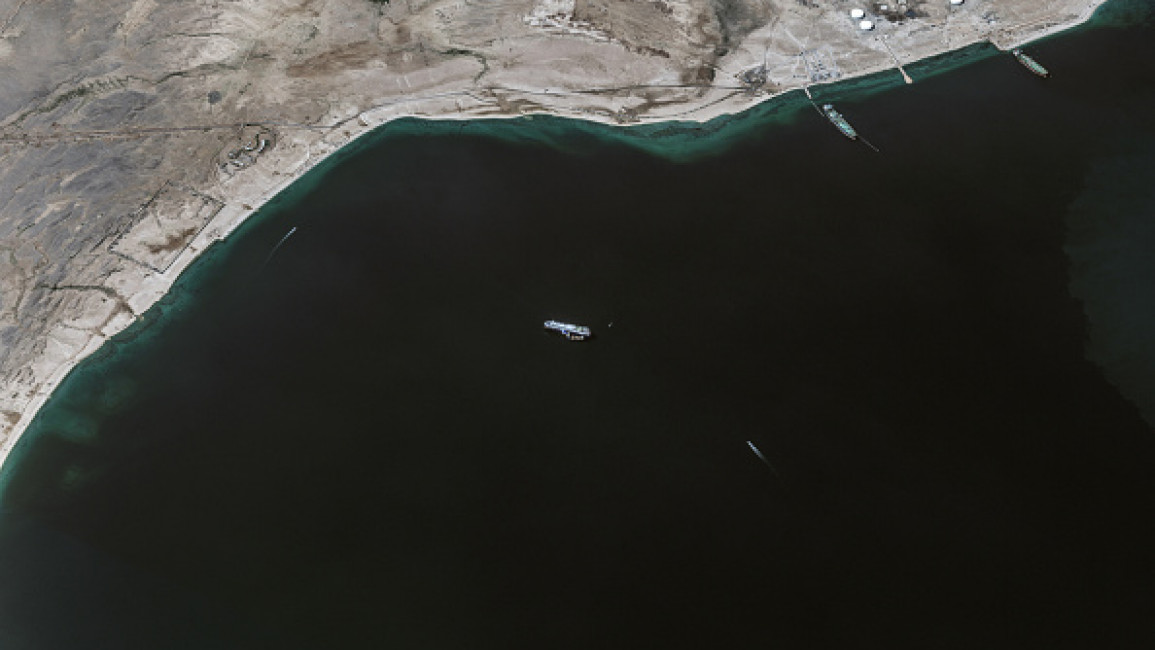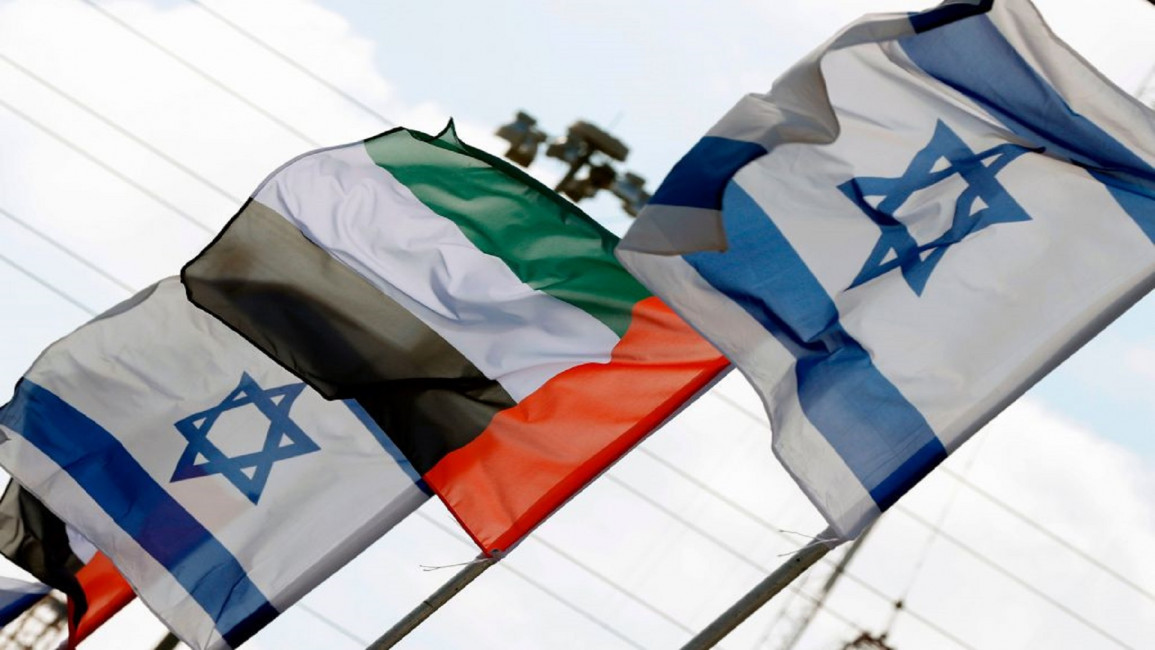
The UAE-Israel land corridor: An alternative to Bab el-Mandeb and the Red Sea?

Tensions are mounting rapidly in the Red Sea following the US and Britain's military strikes on Yemen in response to the Houthis' targeting of commercial vessels heading to Israel.
Since November, the Yemeni group's attacks have primarily targeted the Bab el-Mandeb Strait in a bid to put pressure on Israel to stop its devastating war on Gaza.
As hostilities escalate, so do the risks to all shipments transiting through the strategically vital sea passage, where 12 percent of global trade passes annually, accounting for one trillion dollars each year.
This has seen shipping companies frantically searching for alternative routes. One of these is the recently established Dubai-Haifa "land corridor" - an "express land route" which connects Dubai's Jebel Ali Port in the UAE to Israel's Haifa port, via roads passing through both Saudi Arabia and Jordan.
This overland line has quickly developed vital importance to Israel, especially with regards to its import and export of perishable goods like fresh food products, as well as raw materials and items which require fast delivery to customers.
"The land corridor connects Dubai's Jebel Ali Port in the UAE to Israel's Haifa port via roads passing through both Saudi Arabia and Jordan"
The truck driving operations are carried out from the Dubai port to Haifa via two shipping companies, Israel's Trucknet and the UAE's PureTrans, according to a report recently published by Israeli news site Walla.
During the trial phase of the new transport route in December, ten trucks completed the journey from Dubai's port to Haifa. This pilot followed the announcement by Trucknet and PureTrans at the beginning of December that they had signed an agreement in principle for cooperation in establishing a "land bridge" between the ports of Dubai and Haifa.
Both companies claimed the new route would contribute to reducing freight transportation costs by over 80 percent in comparison with current sea freight costs due to the rerouting of commercial ships to take the longer route around Africa to avoid risking Houthi attacks.
The use of the Dubai-Haifa land corridor as an alternative to the Red Sea was primarily in the UAE's financial interests, as it was the Gulf state which had normalised with Israel to the greatest extent and was therefore the most anxious about possible attacks by the Houthis, according to Israeli public broadcaster Kan.
Bypassing the Red Sea
Economic affairs specialist Nehad Ismail explained to Al-Araby Al-Jadeed, The New Arab's Arabic-language sister edition, that the land corridor connecting the Dubai port to Haifa port had first been proposed at the time of the Abraham Accords in 2020, however, the war on the Gaza Strip and the Houthis' targeting of ships heading to Israel in the Red Sea had seen it take on heightened significance.
He added that when the agreement was signed, Israel had claimed that the goal of the overland route was not to weaken Egypt economically or to replace the Suez Canal with the land corridor. Rather, it was to create a faster route which would be complementary to the canal.
Israel had also dangled the possibility of connecting the new transit network to Egyptian ports on the Mediterranean Sea, from which routes to Europe could be established.
These claims were made despite the fact that Israel has clear aspirations to make Haifa port the main gateway to Europe. For instance, Haifa port is set to be a cornerstone of the India-Middle East-Europe Economic Corridor (IMEC), a mega-infrastructure project which seeks to enhance connectivity and economic integration between India, the Gulf and Europe.
|
|
The IMEC has been backed enthusiastically by the US as a perceived counterweight to China's longstanding Belt and Road Initiative (BRI).
Ismail believes that the land corridor aims to alter the political and economic map of the Middle East in Israel's favour by bypassing the Red Sea. It will also see Israel's integration into the economies of the Gulf states - another strategic goal.
He says the Gulf states participating in the land corridor scheme may well reap some economic benefits – the overland route will take 7-10 days less than the sea route, for example. "However the biggest beneficiary from this project will be Israel," he added.
Ismail says that despite Israel's aspirations, and its recent trial runs of the land route, the corridor is unlikely to surpass other trade networks.
"The Suez Canal remains the world's practical and economic corridor for the transport of millions of barrels of oil and thousands of tonnes of gas and other goods, which require a sea transport corridor, not a land one - so the need for the Red Sea will remain."
"Analysts say the land corridor aims to alter the political and economic map of the Middle East in Israel's favour by bypassing the Red Sea"
Cutting costs
Economic analyst Amer Shobaki confirmed that the Dubai-Haifa corridor will operate for the transport of goods from South Asia to Israel by way of the UAE, Saudi Arabia, and Jordan and it aims to reduce the costs and duration required for the delivery of goods, which is becoming increasingly important in light of the crisis in the Red Sea.
The current refusal of many shipping companies to cross the Red Sea has led to vastly increased costs and a much longer journey as ships resort to sailing around the African continent and the Cape of Good Hope.
The costs can be four times higher, and the journey time could be up to three months long for a journey which would have taken one week – depending on the number of ports the ship anchors in. This makes the land route by far the fastest way for cargo to reach Israel from the UAE currently.
Shobaki says the same applies to Jordan, as it is cheaper and quicker to transport goods overland to and from the UAE and Saudi Arabia than via the sea route – so the land corridor has similar benefits on this front.
He points out that because Jordan will enjoy clear benefits from the land transit network, Lebanon has also asked to be connected to the land corridor for its fruit and vegetable exports heading for the Gulf states.
However, Lebanon's obstacle is that Saudi Arabia announced the suspension of fruit and vegetable imports from Lebanon in 2021, stating that shipments were being used for drug smuggling – meaning that currently they are not permitted to even transit within Saudi territory – which will hinder Lebanon's participation in the network for the time being.
|
|
Additional revenue streams for the Gulf
Regarding expected revenue streams for Saudi Arabia and the UAE from the operation of the Dubai-Haifa land corridor, Shobaki says these will mostly be from fees for unloading goods in the ports, and for operating these ports. He clarifies that some of the goods will start their journey at Saudi Arabia's Dammam Port rather than Dubai's Jebel Ali Port.
He explains that the revenue from handling fees at the UAE and Saudi ports, as well as transit fees on the roads, represented an additional resource stream for the two Gulf states.
Other ports in the Gulf region stand to benefit from the land corridor if the Red Sea crisis persists, because Dammam Port and Jebel Ali Port are already seeing congestion. He says Salalah Port in Oman could become part of the network to alleviate this issue.
This will likely happen due to the severe traffic at Dammam Port, which is because the bulk of cargo which used to arrive at Yanbu Port on Saudi Arabia's western coast (via the Red Sea), is now being sent to Dammam on its eastern coast, according to Shobaki.
This is an edited translation from our Arabic edition with additional reporting. To read the original article click here.
Translated by Rose Chacko
This article is taken from our Arabic sister publication, Al-Araby Al Jadeed and mirrors the source's original editorial guidelines and reporting policies. Any requests for correction or comment will be forwarded to the original authors and editors.
Have questions or comments? Email us at: info@alaraby.co.uk



![President Pezeshkian has denounced Israel's attacks on Lebanon [Getty]](/sites/default/files/styles/image_684x385/public/2173482924.jpeg?h=a5f2f23a&itok=q3evVtko)



 Follow the Middle East's top stories in English at The New Arab on Google News
Follow the Middle East's top stories in English at The New Arab on Google News


